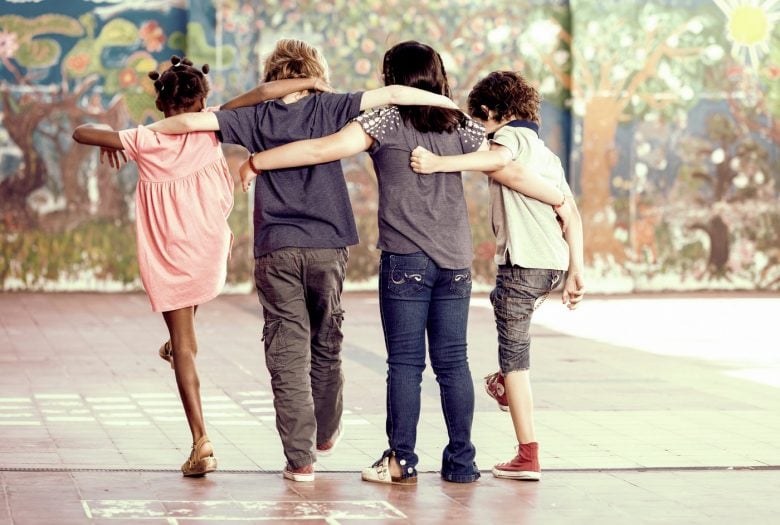You probably had a best friend growing up — and looking back across the generations, almost all of our ancestors had their best friends.
Those friends weren’t always the same from year-to-year or city-to-city, but they were special, and they were important… and now best friends seem to be becoming a rare breed, indeed.
How times have changed
When we adults were kids, our mothers would push us out of the house and say, “Go find a friend. Be home by dinner.” And we did. It was in our neighborhood that we met friends.
Then we went to grade school. We went through a bevy of best friends, but the cool thing was that every year there would be a new one. After school, we’d go over to their house to play. Or they would come over to ours.
In junior high, there would be best friends waiting in every grade. Same thing in high school, only there would be even more friends, a gang of friends.
We knew how to handle the playground. We learned how to handle rejection. We learned how to work our way into a group. We developed social skills that served us well in the adult world. Sometimes we got mad at our best friend, but was all just part of learning how to deal with people. We got over it. We stayed friends.
How friendships are different today
Today, however, most kids’ best friend are their parents. And if our child is shy, chances are, his best friend is 4000 miles away he met on the Internet.
First off, according to the Wall Street Journal, there are consequences to kids growing up without a best friend or two. Research shows that having a best friend is important. Children without a best friend suffer from stress, loneliness, teasing and abuse by peers.
But kids with best friends have learned the code of the playground. They are friendlier, kinder, and have a better reputation. They also have less depression and anxiety through adolescence and beyond.

Fred Frankel, author of Friends Forever, a book for parents about children’s friendships and founder of a children’s friendship-skills program at UCLA says, “Many psychologists agree that having a best friend is one of the most significant social outcomes of childhood.”
But today, making a best friend is hard. We’re so convinced our children are going to be kidnapped that we won’t push them outside like our parents did, so the opportunity just to meet kids in the neighborhood is limited.
Secondly, most everyone meets their best friend at school, but some schools are so paranoid about cliques and bullying today that they will actively break up any relationship that seems like it’s too tight.
Sports play an important role in many kids’ lives, and our kids can meet best friends there. But unless one of these friends lives in our neighborhood or goes to the same school they’ll hardly ever become “best friends.”
And then there’s the computer and Instagram, Tik Tok, Facebook, Snapchat and all the other wonderful ways a child can develop a bunch of shallow friendships that are of little value when she just needs to “hang” with her best friend for comfort and solidarity.
A 2012 Stanford University study of 3,461 girls ages 8 to 12 found those who spent a lot of time multitasking online had fewer and poorer-quality friendships.
There’s growing evidence that screen time is weakening children’s social skills — an important quality for future adult relationships.
So what can a parent do?
Here are five steps you can try to help your child find a good friend.
1. Push your child outside if you live in a neighborhood with other kids. This is where a young child will first learn acceptance, rejection, getting along with others and standing up for herself.
2. If that seems too scary, walk around the neighborhood with your child and find where other kids live. Knock on doors. Set up playgroups and play dates.
3. As your child gets older, send them to church camp [or a similar community-based camp]. It’s quite possible they’ll meet a future best friend in their neighborhood. Again, do what you can to encourage face-to-face time, not just Facebook time.
4. Encourage your grade-school child to play soccer or another sport where teams are formed around neighborhoods. He’ll meet other kids, and if he says he wants Shawn to spend the night, make it happen. Don’t get in the way of a budding friendship.
5. Okay, you’ve done your part, now get out of the way. Friends will fight. Sometimes your son will come home with a black eye. Before you get hysterical, realize the next day they’ll be best friends again. Girlfriends will sometimes end the friendship. Don’t get involved and make it a big deal.
Let your kids solve their relationship problems themselves. This is so important, but many parents try to run interference here rather than let their child suffering. But suffering is okay. Tell your daughter just go make another friend.
Children need close friends. They need to learn the skill of maintaining a friendship, repairing one, keeping one.
Close friends are a gift of childhood. Let them happen.








